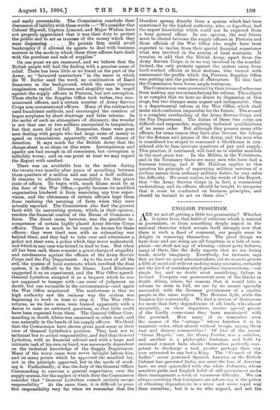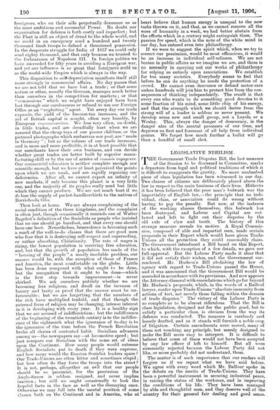ENGLISH PESSIMISM.
ARE we not all getting a little too pessimistic ? Whether it arises from that habit of criticism which is natural in journalists, or from something deeply seated in the national character which reveals itself strongly now that there is such a flood of comment, our people seem to delight in censuring themselves. The great things we have done and are doing are all forgotten in a tide of com- plaintâwe shall not say of whiningâabout petty failures, many of them, like the daily reports that we are losing trade, nearly imaginary. Everybody, for instance, says that we have no good administrators, yet we seem to govern a fifth of mankind without making many mistakes, certainly not the kir d of mistakes which produce insurrections,âour single big, and no doubt most mortifying, failure is Ireland. Compare our government even of the blacks in South Africa, where, for reasons that it would take a volume to state in full, we are by no means specially successful, with the German government of a similar people in the same region. The Hereros fight, while the Basutos live contentedly. We find a stream of Governors for more than forty dependencies of all kinds, who almost invariably, on their departure, receive special proofs of the kindly connexions they have maintained with the governed. How many of us remember even the names of the " satraps " whose function it is to maintain order, often almost without troops, among these vast and diverse communities '? Of two of the recent "Great Moguls," one, Sir Henry Fowler, was a solicitor, and another is a philosophic historian, and both by universal consent have shown themselves perfectly com- petent to discharge a task greater perhaps than any ever entrusted to any but a King. The "Council of the Indies" never governed Spanish America as the British Cabinet has governed India, nor since the loss of America have we ever quarrelled with the white Colonists, whose sensitive pride and English habit of self-government make their management a work of enormous difficulty. We are always asserting that foreigners are advancing in the policy of obtaining dependencies in a wiser and more rapid way than ourselves ; but it is we who expand, and not the foreigners, who on their side perpetually denounce us as the most ambitious and successful Power. No doubt our organisation for defence is both costly and imperfect ; but the Fleet is still an object of dread to the whole world, and we could in an emergency send a hundred and twenty thousand fresh troops to defend a threatened possession. In the desperate struggle for India of 1857 we could only send eighty thousand, and that only because we trusted to time forbearance of Napoleon III. In foreign politics we have succeeded for fifty years in avoiding a European war, and yet our influence is so great that foreigners scold us as the world-wide Empire which is always in the way.
This disposition to self-depreciation manifests itself still more strongly in commercial affairs. No day passes that we are not told that we have lost a trade ; or that some nation or other, usually the German, manages much better than ourselves in the competition for markets ; or that " concessions " which we might have enjoyed have been lost through our carelessness or refusal to use our Foreign Office as an " exploiting " agent. Yet every day our trade expands, the yield of the Income-tax increases, and the aid of British capital is sought, often very humbly, by European concessionaires. We lose very often, no doubt, in little trades, and are dreadfully hurt when we are assured that the cheap toys of our poorer children, or the pictured photographs which embarrass our post, are " made in Germany " ; but as the volume of our trade increases, and is more and more profitable, it is at least possible that our merchants know their own business, and can decide whether great trades are better built by superior mann- fa,cturing skill or by time use of armies of commis voyageurs. Our commercial education is neither complete enough nor scientific enough, but we have at least perceived the points upon which we are weak, and are rapidly repairing our deficiencies. After all, we cannot expect an infinity of new markets, if only because this planet is a very little one, and the majority of its peoples really need but little which they cannot produce. We are not much hurt if we do lose the supply of pocket-handkerchiefs to the natives of Borrioboola Gila.
Then look at home. We are always complaining of the social condition of the three kingdoms, and the complaint is often just, though occasionally it reminds one of Walter Bagehot's definition of the Socialists as people who insisted that no one should go barefoot, and that every one should have one boot. Nevertheless, benevolence is becoming such a mark of the well-to-do classes that there are good men who fear that it is destroying self-respect and superseding, or rather absorbing, Christianity. The rate of wages is rising, the lowest population is receiving free education, and, but that the growth of population has made of the "housing of the people" a nearly insoluble problem, our masses would be, with the exception of those of France and America, the most comfortable on the globe. Little has been done compared with what ought to be done, but the recognition that it ought to be doneâwhich is the first step towards improvementâis never shirked. We ask ourselves publicly whether we are becoming less religious, and dwell on the increase of luxury and laxity as proof that the answer must be un- favourable; but we are forgetting that the numbers of the rich have multiplied tenfold, and that though the external form of religion may be changing, intense interest in it is developing with every year. It is a healthy sign that we are accused of indifferentism ; but the indifference of the beginning of the twentieth century is to the indiffer- ence of the eighteenth what the ignorance of to-day is to the ignorance of the time before the French Revolution broke all chains of contented habit. Socialism advances among usâthe newspapers sayâat locomotive speed ; but just compare our Socialism with the same set of ideas upon the Continent. How many people would extreme English Socialists put to death if they were supreme, and how many would the Russian Socialist leaders spare ? Our Trade-Unions are often bitter and sometimes stupid ; but how often do they force the troops into the street? It is not, perhaps, altogether an evil that our people should be so pessimist, for the pessimism of the Anglo-Saxon is seldom resigned, and never implies inaction ; but still we ought occasionally to look the hopeful facts in the face as well as the dismaying ones. Otherwise we may fall into the mental position of some classes both on the Continent and in America, who at heart believe that human energy is unequal to the new tasks thrown on it, and that, as We cannot remove all the woes of humanity in a week, we had better abstain from the efforts which in a century might extinguish them. The passion for speed, which is the note of the white mind in our day, has entered even into philanthropy. If we were to suggest the spirit which, when we try to correct our pessimism, would be most efficacious, it would be an increase in individual self-reliance. We are not beaten in public affairs as we imagine we are, and there is no necessity in carrying out our works of philanthropy for relying so entirely upon associations. We establish far too many societies. Everybody seems to feel that before he can do anything he needs the protection of A crowd. He cannot even denounce or defend motor-cars unless hundreds will join him to protect him from the con- sequences of thinking independently. The result is that every one who wants to do something good devotes to it some fraction of his mind, some little chip of his energy, and that the strength which we should derive from the strong will of a leader is seldom or never present. We develop some new and small group, not a Loyola or a Wesley. This, always the danger of democracy, is the danger also of the mental processes of our time, and deprives us first and foremost of all help from individual genius. We forget how much further a bullet will go than a handful of small shot.



































 Previous page
Previous page